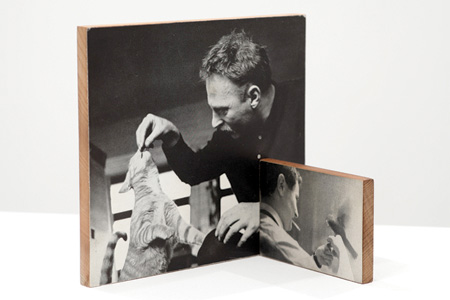
Will Rogan's recent exhibition at Altman Siegel Gallery, "Stay Home," quietly reflected on contradictions of awareness and oblivion, fame and obscurity, portent and banality. Rogan's conceptual, photograph-based work uses imagery of mundane vistas and obscure people to explore themes of impermanence, identity and perception, with an undercurrent of quirky, darkly humorous critique of suburban kitsch. Mmediums 4 offered images of artists or designers at work on paintings and drawings of a geometric nature. These photographs were mounted on small panels overlapping or braced against each other, like a house of cards. Mediums 2 revealed a pair of photos of men with animalsÑan affable guy with a mustache feeding a treat to a cat, and a dapper fellow in a suit, smoking, regarding a small bird fluttering on his outstretched hand. The series apparently employs found photographs gleaned from SFAI library, from discarded artists' catalogs. Enigmatic, the "mediums" of these works' titles might refer to the artists' choices of material, or to the idea of the objects as vehicles for psychic channeling.
"Stay Home," the title of the exhibition, alludes more clearly to Rogan's photos of buildings and streets. Tear Shape is a particularly successful image. Wide pieces of tape loosely skirt the contours of an irregularly shaped crack in a damaged window. Aging Venetian blinds shutter the window, while a mysterious flecking and splotching suggest both reflection of clouds and the patina of weathered glass and yellowing adhesive. The Floor focuses on a dreary patch of matted, low-pile carpet, mirrored paneling and hexagonal floor tiles. A tiny circular object, perhaps a misplaced earring, acquires an odd significance. O O, a rather sinister image, is really just a benign garden hose, looped into a pair of irregular ovals and tucked away on hangars against a house. Translated to black, the dark, twisting tubes suggest bondage and other non-gardening associations--clinical or kinky.
Waxing poetic, Man Versus Clock: the Unequal Struggle documents an aging book on the philosophy of time to point out the impermanence of everything, even a theory of impermanence, as layers of conceptual irony thicken. We may find ourselves adopting an existentialist stance, accepting moments as they come, frozen, isolated in time without a meaningful structure. Rogan takes these slices of life, significant or not, and reshuffles them, laying them out in a new configuration for our contemplation.
This article was written for and published in art ltd. magazine ![]()
